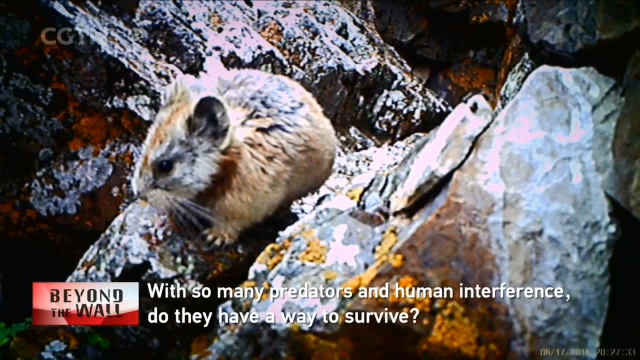
13:18, 15-Sep-2018
The 'Magic Bunny': Climate change threatens endangered Ili Pika
Updated
12:48, 18-Sep-2018
05:29

Today, we focus on a tiny creature known as the Ili Pika. The cute mammals are related to the rabbit. And they are one of the world's most endangered animals – with fewer than 1000 surviving in the wild. Climate change is a threat to their existence. CGTN correspondent Han Bin followed a senior conservationist in China's Xinjiang Uygur Autonomous Region, who shared his changing concept on wildlife protection.
All is not well in the Tianshan Mountains. The Number One Glacier is melting. The glacier is some 120 kilometers southwest of Urumqi. And it's the very last home of a very rare species - the Ili Pika.
LI WEIDONG, CONSERVATIONIST NATURAL ECOLOGICAL PROTECTION STUDIO, XINJIANG "The Ili Pika is a cold-tolerant species and a barometer of climate change. If the rabbits disappear, it would mean that our human environment is also disappearing."
Li Weidong has been on a journey of observation for over 30 years, to document and protect the elusive pika.
LI WEIDONG, CONSERVATIONIST NATURAL ECOLOGICAL PROTECTION STUDIO, XINJIANG "The Ili Pika isn't on the wildlife protection list. We hope to protect them through national laws. I've been pushing for a national reserve or reserve park in the area where it lives."
Li first encountered the Ili Pika back in 1983. He managed to capture a snap of it in 2014. Now new cameras are used to get glimpses of their lives.
The pikas make their home in the nooks and crannies high on the mountain. This helps them elude the hungry and the curious, but it also makes Li's work more difficult. Li Weidong says what's needed is a complete change in concept from observation alone.
LI WEIDONG, CONSERVATIONIST NATURAL ECOLOGICAL PROTECTION STUDIO, XINJIANG "With a national conservation park, we can set up an alpine conservation station to further protect the rabbit, and more importantly, to help them keep breeding in the same area."
The pika habitat has shrunk by 70 percent over the years. Li estimates fewer than 1,000 now live in the wild. And the habitat continues to shrink at an alarming speed. The pika is even rarer than the panda and snow leopard. Rising temperatures brought by climate change are pushing them to elevations of 4000 meters. It may take a miracle to save the magic bunny. Li is painfully aware of the urgency to set up the reserves.
"Here are some feces, smaller than soybeans."
The alarming glacier melt has drawn scientists from around the world.
"This is Professor Li. This is the new species. We've got to it, on the snowy mountain. It's very small. It's an animal that lives only in the very high mountains. Very difficult to find these animals. How many cameras have you operating here?"
"Twenty-two."
PROFESSOR CHRISTOPH SCHNEIDER HUMBOLDT UNIVERSITY, BERLIN "It's not possible to protect the single glacier, you have to protect the global climate, then you will protect the glaciers as well."
Li Weidong says the public has to get involved.
LI WEIDONG, CONSERVATIONIST NATURAL ECOLOGICAL PROTECTION STUDIO, XINJIANG "The lecture is to popularize the concept of environmental protection, and more importantly, through the education on Ili Pikas, to raise people's awareness of environmental protection. We hope more people can take action and work together to save it from extinction."
"It's marking its territory. With so many predators and human interference, do they have a way to survive?"
Li wants to break the ignorance by campaigning.
Li is 63, and his climbing days are numbered. But he knows his work is far from over. For him and the Ili Pikas, it's a race against time.
HAN BIN GLACIER NO. 1, URUMQI "We have learned that global warming has forced this tiny mammal to move farther up the mountain and this makes it even harder for the scientists to find and study them. Ili Pikas are being threatened by both nature and humans."
LI WEIDONG, CONSERVATIONIST NATURAL ECOLOGICAL PROTECTION STUDIO, XINJIANG "Many endangered species have disappeared without being documented. I've been studying Ili Pikas for over thirty years and could only find fewer than thirty. Now I feel really sad. I have discovered and named the species. I'll feel so guilty if it becomes extinct in front of me."
The fate of the pikas lies beyond the mountains. Li Weidong knows if global warming continues, the magic bunny's chances will get even smaller. And that's the real challenge he is facing. Han Bin, CGTN from Xinjiang.

SITEMAP
Copyright © 2018 CGTN. Beijing ICP prepared NO.16065310-3
Copyright © 2018 CGTN. Beijing ICP prepared NO.16065310-3